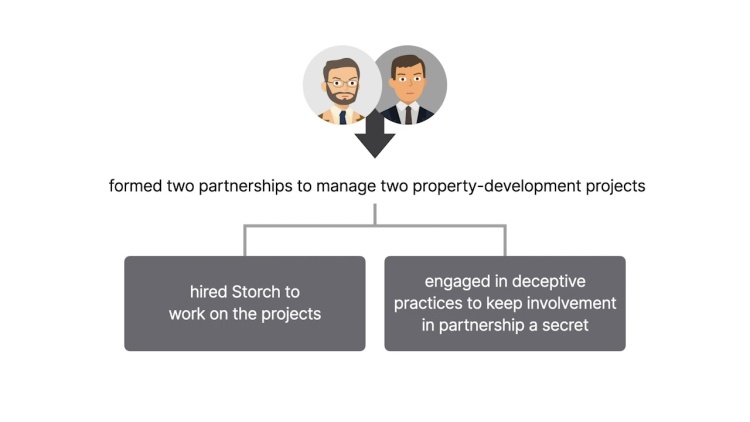Vigneau v. Storch Engineers
Connecticut Superior Court
1995 WL 767984 (1995)
- Written by John Caddell, JD
Facts
Donald Vigneau (plaintiff) was partner in Storch Engineers (Storch) (defendant), a consulting firm. Storch’s partnership agreement required Vigneau to “devote his whole time and attention” to the business of the partnership, and to always give the other partners “full information and truthful explanations of all matters relating to” partnership business. The agreement also provided that the partnership must purchase the partnership interest of retiring partners. In 1983, Vigneau and Joseph Merluzzo, another Storch employee, formed a real estate development partnership known as Highview Condominium Associates (HCA). Without informing Storch of his dual role, Vigneau caused HCA to hire Storch to do the engineering work for its project. Vigneau earned a profit of over $28,000 for his investment in the HCA venture. Vigneau and Merluzzo launched a second real estate venture, also without Storch’s knowledge, called Granford Associates. They similarly hired Storch to do the engineering work. Granford was unprofitable, ultimately resulting in a $22,000 loss to Vigneau. Storch was paid at a fair market rate for its work for both Granford and HCA. Vigneau resigned from Storch in 1987. In 1989, Storch discovered Vigneau’s role in HCA and Granford. Vigneau sued Storch, demanding that he be paid for the value of his partnership interest, stipulated to be worth $167,794. Storch argued that it was not required to do so, since Vigneau breached his duty of loyalty by engaging in self-dealing. Storch also counterclaimed against Vigneau for breach of fiduciary duty, seeking recovery of the $164,105 Vigneau received in compensation for his work for Storch during the time of his breach.
Rule of Law
Issue
Holding and Reasoning (Satter, J.)
What to do next…
Here's why 907,000 law students have relied on our case briefs:
- Written by law professors and practitioners, not other law students. 47,100 briefs, keyed to 996 casebooks. Top-notch customer support.
- The right amount of information, includes the facts, issues, rule of law, holding and reasoning, and any concurrences and dissents.
- Access in your classes, works on your mobile and tablet. Massive library of related video lessons and high quality multiple-choice questions.
- Easy to use, uniform format for every case brief. Written in plain English, not in legalese. Our briefs summarize and simplify; they don’t just repeat the court’s language.





